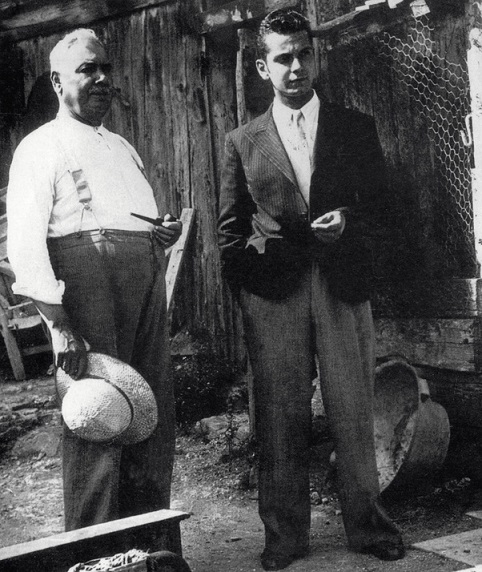Les quatre bacheliers
The four striplings [1]
Georges Brassens (1966)
|
|
NOTES
|
[1] Le thème du menu larcin touchait chez Brassens une corde sensible: Alors qu'il n'avait que 16 ans, Georges et ses copains décidèrent de se faire des sous en dérobant des objets à leurs propres familles. Lui-même chipa des bijoux à sa sœur. La police arrêta toute la bande. Certains des parents n'hésitèrent pas à laisser leurs rejetons aller en prison. Le père Brassens récupéra immédiatement son fils au commissariat et prit sa défense. Mais Georges fut chassé de son collège et ses parents décidèrent de l'envoyer à Paris en février 1940 pour étouffer le scandale. Il habita chez la sœur de sa mère, la tante Antoinette qui lui fit faire la connaissance de la fameuse Jeanne Planche dont on aura à reparler..." (Note tirée du blog de David Yendley (http://dbarf.blogspot.fr/2011/01/)). [2] Bachelier, écolier, vergogne: trois mots antiques qui visent à mettre à distance la médiocrité de ce fait-divers et d'en excuser les auteurs. « Vergogne » (honte) n'existe plus que dans l'expression citée par Brassens, « sans vergogne » ; « écolier » a, à la fois, le sens moyenâgeux et métaphorique d' « élève de l'Université » (breton : « kloareg ») et celui de « néophyte, inexpérimenté ». Quant à « bachelier »: a ici le sens de « jeune homme quelconque » ou celui, moyenâgeux, de « jeune gentilhomme aspirant à être fait chevalier », non pas celui de « titulaire du baccalauréat ». Même s'il fut encouragé dans sa vocation de poète par son professeur de français, Alphonse Bonnafé, à partir de 1936, Georges n'était pas un élève studieux au point d'avoir décroché le baccalauréat à 16 ans, au printemps 1938. Il ne semble pas qu'il ait eu l'occasion de reprendre ses études après sa mésaventure qui se solda, pour lui, par une peine de prison avec sursis en 1939. [3] A de la corde de pendu: Même si la corde d'un pendu était jadis considérée comme un porte bonheur, il est évident que Brassens veut dire ici qu'une crise d'adolescence mal gérée par l'entourage des adultes peut conduire l'intéressé à des formes de délinquence bien plus graves, y compris celles justifiant, autrefois, la peine de mort. [4] De ce tonneau-là Il n'est pas étonnant qu'un grand pays viticole utilise le mot "tonneau", sous-entendu "rempli d'excellent vin", comme synonyme de "valeur, qualité ou nature exceptionnelles". [5] Hébreux : les Évangiles et le reste du Nouveau Testament étaient à l'origine en grec, non en hébreux. [6] Jean-Louis Brassens, n'entendit peut-être jamais le pieux hommage que lui rendait son fils Georges. Il mourut le 28 mars 1965 et les « Quatre bacheliers » ne figurent au répertoire du chanteur-compositeur qu'à partir de 1966. |
[1] The theme of petty thieving touched a raw nerve with Brassens. - When he was sixteen, Georges and some schoolmates decided to make money by stealing from their families. Georges stole items of jewellery from his sister. The police were alerted and apprehended the gang. Some of the parents felt little mercy for their sons and left them to serve prison sentences. Brassen's father immediately picked up his son from the commissariat to support him, but Brassens was expelled from school and his parents decided to send him to Paris in February 1940 to escape the scandal. He lived at the house of his mother's sister, Aunt Antoinette (and there he met Jeanne Planche who was to play a big part in his life...)". (Note borrowed from David Yendley's blog (http://dbarf.blogspot.fr/2011/01/)). [2] Bachelier, écolier, vergogne: three ancient words that aim to distance the mediocrity of this petty news item and to excuse the culprits. "Vergogne" (shame) no longer exists except in the expression quoted by Brassens, "without shame"; "écolier" has both the medieval and metaphorical meaning of "university student" (old meaning of “clerk”, Breton: "kloareg") and that of "neophyte, inexperienced person". As for « bachelier » it has here, as the English “bachelor”, the meaning of "any young man" or the medieval meaning of "youthful knight, novice in arms", by no means that of "holder of the baccalaureate". Although he was encouraged in his vocation as a poet by his French teacher, Alphonse Bonnafé, from 1936, Georges was not a studious student who would have obtained the baccalaureate at the age of 16, early in 1938. It does not seem that he had the opportunity to resume his studies after his misadventure which resulted in a suspended prison sentence in 1939. [3] A hanged man's noose: Even if a hanged man's noose was once considered a lucky charm, it is obvious that Brassens means here that an adolescent crisis, if wrongly managed by the entourage of adults, can lead the youth concerned to much more serious forms of delinquency, including those justifying, in former times, the death penalty. [4] From that cask It is not surprising that a great wine-growing country uses the word "cask", implying "filled with excellent wine", as a synonym for "value , exceptional quality or nature". [5] Hebrew: the French phrase “C'est de l'hébreux pour lui” translates litterally as “It is Hebrew to him”. However, the Gospels and the rest of the New Testament were originally in Greek, not Hebrew! [6] Jean-Louis Brassens, perhaps never heard the pious homage paid to him by his son Georges. He died on March 28, 1965 and the "Four Bachelors" did not appear in the singer-songwriter's repertoire until 1966. |
 Louis Brassens et son fils à l'époque des "événements" Brassens chante "Les 4 bacheliers" accompagné de P. Nicolas et N. Favereau |
